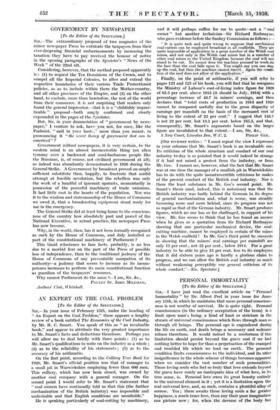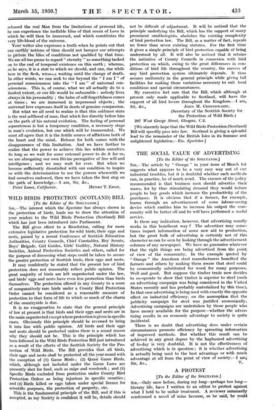PERSONAL IMMORTALITY
[To the Editor of the SPECTATOR:]
have just read the excellent article on Personal Immortality " by Dr. Albert Peel in your issue for Janu- ary 11th, in which he maintains that mere personal conscious- ness is not worthy of survival. He is quite right. Personal consciousness (in the ordinary acceptation- of the term) is a limit upon man's being, a kind of knot or stricture in the stream of universal consciousness which flows through man as through all beings. The personal ego is engendered during the life on earth, and death brings a necessary and welcome release therefrom. It would indeed be a misfortune if this limitation should persist beyond the grave and if we had nothing better to hope for than a perpetuation of the cramped and troubled life which we lead on earth. The personal condition limits consciousness to the individual, and its utter insignificance in the *hole scheme of things becomes apparent when we consider the vast number of such personalities. Those loving souls who feel so truly that love extends beyond the grave have surely an inadequate idea of what love, in its true sense, is. Personal love owes its great beauty entirely to the universal element in it ; yet it is a limitation upon the real universal love, and, as such, contains a plentiful alloy of sorrow. Yes ; there awaits those loving souls a far greater happiness, a much truer love, than any their poor imagination can picture now ; for, when the decease of the body has
released the real Man from the limitations of personal life, he can experience the ineffable bliss of that ocean of Love in which he .will then be immersed, and which constitutes the very- life-blood of the universe.
Your Writer also expresses a truth when he points out that our earthly' notions_ time should not hamper our attempts to picture the bliss of conditions not qualified by that time. We are all too prone to regard "_eternity " as something tacked on to the end of temporal existence on this earth ; whereas, as he says, it is a state to which we-should, and can, rise while here in the flesh, witnouc waiting until the' change of death. In other words, sve can Seek.to rise beyond the " I am I " of personal consciousness into the " I am " of universal con- sciousness. This is, of course, what we all actually do to a limited extent, or our life would be unbearable : nobody lives alWays_, in his personality ; the balm of self-forgetfulneis comes at times ; we are immersed in impersonal objects ; the Universal lcive expresses itself in deeds of genuine compassion.
But what we all need to realize is that this sublimer state is the real selfhood of man, that which lies directly before him on the path of his natural evolution. The feeling of personal separateness is but a temporary condition, a necessary stage in man's evolution, but one which will be transcended. We must all agree that it is the fertile source of afflictions both of the heart and the mind. Release for both comes with the disappearance of this limitation. And we have further to realize that the power to achieve this lies within ourselves. So long as we wait for some external power to do it for us, we are abrogating our own Divine prerogative of free will and intelligence ; and we may wait for ever, But when we become sufficiently dissatisfied with our condition to inspire us' with 'the determination to use the powers wherewith we fmd ourselves endowed, then we have taken the first step on the path of knowledge.—I am, Sir, &c.,





















































 Previous page
Previous page